|
In St. Peter’s speech at Pentecost he proclaims, “But God raised him up, releasing him from the throes of death, because it was impossible for him to be held by it.” (Acts 2:24) The truth of St. Peter’s words is made manifest in the liturgical rhythm of the Church year. Just as our Lord could not be held by the grave, the celebration of Easter cannot be held to just one day. In her beauty, the Church does not stop at the Octave of Easter either, but offers the faithful an entire liturgical season—50 whole days—to glory in Jesus’ resurrection. As Pope St. John Paul II declared, “We are an Easter people.” But once the beautiful liturgies of the Octave are behind us, the Easter lilies are removed from the churches, and the carrot cake has all been eaten, how are we to be an Easter people?
One good place to begin is entering into the celebration of the liturgy. I have a distinct childhood memory of attending Easter Sunday Mass while my family was away on spring break. During the homily the priest invited everyone to exclaim ‘alleluia!’, and then do it again because we weren’t enthusiastic enough. As an unobservant and not-the-best catechised child, the purpose of this exercise was lost on me. But now, as a frequent daily Mass attendee I am much more aware of the forty long, alleluia-less days of Lent and more fully appreciate the significance of proclaiming alleluia together with renewed vigor on Easter and in the days that follow. During Lent many of us are motivated to make more time for Mass or prayer in our lives, which are beautiful practices to continue through the Easter season and beyond. Throughout the Masses of the Octave, the Victimae paschali laudes, an ancient chant, may be recited before the Gospel. Whether you attend Mass and hear the chant or simply take time to meditate on it each day, it is a beautiful tool for reflecting on the Paschal mystery in our lives and offering extra praise to the Lord: “The sheep are ransomed by the Lamb; / and Christ, the undefiled, / hath sinners to his Father reconciled.” Just as Lent is a time of remembering our mortality, Easter can be a time of remembering our Eternal life. Another liturgical tool to draw on is the Liturgy of the Hours, the communal prayer of the Church. In Morning Prayer throughout the Octave, we use the same psalms and canticle of Easter Sunday morning for all eight days. Particularly striking is the Canticle of Daniel (Daniel 3:57-88, 56), in which we pray that all things on Heaven and Earth bless the Lord: Let us bless the Father, and the Son, and the Holy Spirit. Let us praise and exalt him above all forever. Blessed are you, Lord, in the firmament of heaven. Praiseworthy and glorious and exalted above all forever. Whether you are able to pray Morning Prayer, or any of the other hours, in community or humbly pray them alone, you are still raising your prayers with all the faithful throughout the Earth and elevating them through Jesus to the Father. Throughout the Easter season, the first readings at Mass are taken from the Acts of the Apostles. Practically this makes sense since Acts recounts the events following Jesus’ death and resurrection. But there is also a spiritual significance to reading from this book during the Easter season. Just like His first disciples, we aren’t meant to keep our alleluias and joy in the Lord’s resurrection and salvation confined to our churches or to ourselves, but to proclaim them to the world. It took a little encouragement for the apostles to do this, and so it may for us, but we too can say with St. Peter: “He commissioned us to preach to the people and testify that he is the one appointed by God as judge of the living and the dead. To him all the prophets bear witness, that everyone who believes in him will receive forgiveness of sins through his name.” (Acts 10:42-43) The Easter season is a grace-filled time to unite ourselves to this age-old mission of the Apostles and share the Good News of Jesus. The Catechism of the Catholic Church tells us that, “Beginning with the Easter Triduum as its source of light, the new age of the Resurrection fills the whole liturgical year with its brilliance.” (Paragraph 1168) At the Easter Vigil, the faithful are invited to renew their baptismal promises and remember the light of Christ that is within them. As we make our way through the Easter season, let us glorify Christ in the liturgy and let the brilliance of the Eternal Light shine forth from our churches and our hearts.
0 Comments
Alleluia! Doesn’t it feel great to be able to exclaim that again? After forty days of restraining ourselves from singing it either as part of a hymn or before the Gospel reading was proclaimed, we are finally permitted to once again raise our voices in this superlative expression of thanksgiving, joy, and triumph. In his book, Crossing the Threshold of Hope, Soon-to-be Saint John Paul II boldly announced, "We are the Easter people and ‘Hallelujah’ is our song,” and as such, how can we keep from singing?
On Sunday we celebrated the Solemnity of Easter, the most important liturgical celebration of the year. So grand, so significant is Easter that each Sunday of the year is a reflection of this feast to some degree. Each and every holy sacrifice of the Mass, though, is a memorial of the Lord’s Passion and Resurrection (cf. CCC 1330). It is important, then, to realize what sets apart the celebration of Easter from the rest of the year, apart from the colorful dresses and elaborate dinners that have become traditional for this time of year. On Good Friday, Jesus Christ, the Son of God sent to ransom the world for our sins, hung on the Cross and, after three hours of agony, “bowed His head and gave up His spirit” (Jn:19:30). Though Jesus had warned His followers of His necessary death, they were unable to understand what He was saying and were utterly shocked at what finally happened outside Jerusalem’s walls on that dark day. What a turn of events from when that very city had joyfully embraced Christ’s entrance only a few days earlier! Separated from their teacher and friend, and struggling to deal with the chaotic incomprehensibility of that Passover weekend, the disciples of the Lord locked themselves in the Upper Room of their Last Supper, fearful of what awaited them outside and in the future. Imagine their surprise, then, when Mary Magdalene burst into their presence and breathlessly announced that Jesus’ body had been taken from where it had been laid. Immediately, Peter and “the beloved disciple” ran to the tomb of Jesus, not prepared for what awaited them. What comes next would alter both their and our lives forever. Jesus was dead. There was no doubt about that. The news that Jesus was not in His tomb must have inspired those two disciples with a much needed measure of hope, if not curiosity and wonder, as they boldly ran through the streets to see the sight for themselves. Jesus’ Resurrection was unprecedented, that is, totally and radically new— no one had ever been raised from the dead like this before! Though they were not yet able to fully express, let alone comprehend, what had happened, the disciples would have had their hearts aflame with the news, a combination of joy, relief, praise, excitement, comfort, and hope that needed to be shared with the other followers of the Risen One. Upon their return to the Upper Room, Peter and the beloved disciple, along with Mary Magdalene and the other women with her, become the first evangelizers— proclaimers of the resurrected Christ to the world. Here we find the origins of the Resurrection language Christians used two millennia ago and continue to speak through today. As part of the New Evangelization, we too are called to share the Good News of Christ’s victory over death with everyone, friends and family, peers and enemies alike. It is impossible (if not selfish) to keep such wondrous news to ourselves— we need to share the joy and enthusiasm of the disciples as they gradually began to recognize the significance of the Resurrection, initially in the empty tomb and later through their encounters with the living Jesus. How, then, can we ever become complacent in our celebrations of Easter? In the weeks leading up to Christmas, we anticipate Christ’s first coming into the world with carols, treats, and gift-giving. Easter is so much more important! As the Catechism states: “If Christ has not been raised, then our preaching is in vain and your faith is in vain.” The Resurrection above all constitutes the confirmation of all Christ’s works and teachings. All truths, even those most inaccessible to human reason, find their justification if Christ by his Resurrection has given the definitive proof of his divine authority, which he had promised… The Paschal mystery has two aspects: by his death, Christ liberates us from sin; by his Resurrection, he opens for us the way to a new life. This new life is above all justification that reinstates us in God's grace, “so that as Christ was raised from the dead by the glory of the Father, we too might walk in newness of life.” (651, 654) It is often said that without Easter there would be no Christmas (Or Good Friday). This day celebrates the most important event in all of history, when our lives were changed forever. Now living in the promise of eternal life, we are called to obey Christ’s great Commission, to “go and make disciples of all nations” (Mt: 28:19) This isn’t confined to the octave of Easter (which is technically an eight-day celebration) or one liturgical season, but each and every moment of our lives, through our thoughts, words, and actions. The Resurrection of Jesus is not merely a moment in time, but the very definition of time itself. No matter how dark or painful our lives may seem, we can find comfort in the joys of Easter and carry the spark of that day each day of our lives, to be shared with all. Let us cry out in song that Christ has been raised from the dead: Alleluia! Thomas Wong is a student at The Catholic University of America and a member of the Catholic University Knights of Columbus. On April 13, 1742 in Dublin, Ireland, Handel’s famous oratorio Messiah was premiered. Surprised? When we think of the Messiah we immediately think of Christmastime. Woe to the city orchestra that dares pass the holiday season without at least one performance of one of western music’s most beloved pieces. Yet, far from being a Nativity carol, the Messiah is truly an Easter gift. Part II of the oratorio closes with one of the most well known choruses, “Hallelujah.” It occurs during scene seven, titled “God’s ultimate victory.” This follows scenes dedicated to the Passion, Resurrection, and Ascension of Jesus Christ. Hallelujah For the lord God omnipotent reigneth Hallelujah The kingdom of this world; Is become The kingdom of our Lord, And of His Christ And He shall reign for ever and ever King of kings forever and ever hallelujah hallelujah And lord of lords forever and ever hallelujah hallelujah And he shall reign forever and ever Hallelujah At the beginning of Holy Week, we celebrate Jesus’ entrance into Jerusalem, humbly on a donkey. We are then invited to journey with him. We are there at the Last Supper when the Eucharist is instituted. We stand with the Blessed Mother and John the Evangelist at the foot of the Cross. We mourn Jesus’ death with them. We are asked, “Were you there when they crucified my Lord?” But then, at the Easter Vigil and on Easter Sunday, we rejoice at the news that the tomb is empty. Christ is risen, he is truly risen. At Mass, we do not exclaim “Alleluia” just once. We proclaim it three times. The “Hallelujah” Chorus presents us with what the Triduum and Easter are all about. Christ, through his sacrifice on Good Friday, he takes on the sins of the world and opens Heaven up for the faithful. In his Resurrection on Easter Sunday, death is overcome. In conquering both sin and death, Jesus truly becomes the King of Kings and the Lord of Lords. His rule knows no end, for he reigns for all time. Tradition dictates that when the chorus is sung, all must stand out of reverence for the Messiah. During the Easter season, and indeed all our lives, we too must stand and journey with Christ. By doing so, we take part in that kingdom of our Lord. By doing so, we remain close to the Lord of Lords. By doing so, we can be part of the heavenly chorus that forever sings, “Hallelujah!” Victor David is a Senior at The Catholic University of America and Trustee of the Knights of Columbus at Catholic University. As emerging adults in the Catholic Church many times we are asked the question why are you Catholic? or why do you remain Catholic? Sometimes asked from friends who fell away and sometimes asked by others in the Church that are surprised to see you present and active. We, as a Center, would like to share with you, at the end of each month, why we are Catholic and where it is that we find joy in our faith.
“We are an Easter people and ‘Alleluia’ is our song!” -St. Augustine of Hippo I first heard this quote several years ago, but it wasn’t until recently that I began to understand it more fully. Some of you may be wondering why I am writing about Easter in October, but this is exactly my point! We arealways an Easter people, and we should constantly direct ourselves towards the joy of the Resurrection! Nothing orients one towards Easter quite like participating in RCIA. This year, for the first time, I am helping to prepare catechumens, candidates, and confirmandi for full initiation into the Church during the Easter Vigil mass. This group is distinct from other RCIA groups because it is composed entirely of college students, both graduate and undergraduate, who are studying at the Catholic University of America in Washington, D.C. Every Thursday night, the ten or twelve students come together to learn about the faith through catechetical sessions presented by a member of the theology faculty or one of the chaplains of the university. Some students come straight from rugby practice, others from study sessions in the library, and a few grad students sacrifice time away from their young families to join us. What brings them all together in the campus ministry lounge on Thursday nights is a nascent love for the Church and a deep desire for the grace imparted through her sacraments. To put it simply, even in October they are oriented towards the joy of Easter. The Second Vatican Council’s Pastoral Constitution on the Church in the Modern World (Gaudium et Spes) opens with the following words: The joys and the hopes, the griefs and the anxieties of the men of this age, especially those who are poor or in any way afflicted, these are the joys and hopes, the griefs and anxieties of the followers of Christ. Indeed, nothing genuinely human fails to raise an echo in their hearts. In the next few days, the Church celebrates not only the joy of “All Saints” and the hope of “All Souls,” but we also share in the sorrow of the families and communities whom the faithful departed have left behind. It is this sense of community that calls others into the fold. As members of the Church we are called to share in the burdens of our fellow man, but we do so with the recognition of what God-made-man has already done for us. However heavy our loads, we have hope in Christ who shouldered all of our burdens and sacrificed himself for our sins. We share the grief of others because Christ has shared in our grief; but we must also share the hope and joy that we have in Him . . . the same hope and joy that brings twelve college students together for an hour each week on a busy school night to reflect upon the beauty of our faith. Where do I find joy? In the catechumens who long for Easter – even in October! – and yearn to become members of our community of faith. Leave it to the neophytes in the faith to teach us something about Christian joy! Easter in October? I’m all for it! Brett Garland is a Collaborator with the Catholic Apostolate Center. This post was originally published by the Catholic Apostolate Center in October 2012 I am really blessed to participate at liturgy each Sunday with an awesome community of believers. As we were engaged in Lent and Easter planning, we discussed decorations and flowers for our worship space. We decided that for Easter, rather than dozens of pots of lilies and other plants, fresh cut flowers that we could arrange ourselves would be much more beautiful for our Easter Vigil and Easter Week liturgies. As we were on the phone with the florist ordering stems of lilies and tulips and roses, I also asked her to send pots of hydrangea and azalea. A cry went up from among the committee. "They're ugly! We don't want pots of plants!" After hanging up, I explained that fresh flowers will wilt and die in week, but we were going to need Easter plants that could last for fifty days.
Archbishop Fulton Sheen used to quip, "First we fast, then we feast." Indeed, it is very Catholic to fast and then feast. Remember our forty day Lenten observance a few months ago. Recall all the chocolate and Facebook and television we gave up. Recall all of those Fridays when all we wanted was a hamburger and walked away with a grilled cheese. Recall all the corporal works of mercy and prayer we added to our lives. Recall the trash pickups and nursing homes visits and clothing or food drives we participated in. Recall the violet draped churches and chapels (many, nowadays, with veiled statues) in which we prayed. Recall all of the cacti, thorn and stick floral arrangements with swaths of purple fabric all over them. We Catholics are great at fasting. But, the Church suggests that we should feast more than we fast at Easter time. After all, Easter lasts a ten full days longer than Lent! But sometimes, it's harder to feast. Why? We tried our best to feast. Yes, we gorged on our favorite candy by Easter Sunday night. Gold banners and flowers replaced the empty pots and violet cloths. The statues in our churches are now unveiled. But, the potted hydrangeas and the azaleas are now dead and we are singing "Jesus Christ is Risen Today" with a little less vigor than at Easter Vigil. We forget that violet cloth and the absence of potato chips is not what got us ready for Easter. If our feasting consists only in the superficial things we gave up during Lent, then our Easter Alleluias will never ring more vibrant than the silent vacuum their Lenten absence created. Continuing the party is difficult when we forget what our preparation was. Easter gives us fifty days to continue visiting the sick, mending broken relationships, naming and fixing the parts of ourselves that need healing, volunteering our time and help, and giving aid to those in need. That's how we show that we are people of Resurrection - by sharing the new life Christ won for us with others, and it's the only way we can continue to celebrate for fifty days. For Catholics, the reality is that we are an Easter people all year long. That's a lot of party, but the only way we can continue this Easter joy is by sharing the new life that Christ won for us. Bringing new life where there is sadness and death is the constant call of Easter. And it's a call that goes well beyond these fifty days. David Pennington is the Associate Campus Minister for Liturgy and Worship at The Catholic University of America. As emerging adults in the Catholic Church many times we are asked the question why are you Catholic? or why do you remain Catholic? Sometimes asked from friends who fell away and sometimes asked by others in the Church that are surprised to see you present and active. We, as a Center, would like to share with you, at the end of each month, why we are Catholic and where it is that we find joy in our faith.
“We are an Easter people and ‘Alleluia’ is our song!” -St. Augustine of Hippo I first heard this quote several years ago, but it wasn’t until recently that I began to understand it more fully. Some of you may be wondering why I am writing about Easter in October, but this is exactly my point! We are always an Easter people, and we should constantly direct ourselves towards the joy of the Resurrection! Nothing orients one towards Easter quite like participating in RCIA. This year, for the first time, I am helping to prepare catechumens, candidates, and confirmandi for full initiation into the Church during the Easter Vigil mass. This group is distinct from other RCIA groups because it is composed entirely of college students, both graduate and undergraduate, who are studying at the Catholic University of America in Washington, D.C. Every Thursday night, the ten or twelve students come together to learn about the faith through catechetical sessions presented by a member of the theology faculty or one of the chaplains of the university. Some students come straight from rugby practice, others from study sessions in the library, and a few grad students sacrifice time away from their young families to join us. What brings them all together in the campus ministry lounge on Thursday nights is a nascent love for the Church and a deep desire for the grace imparted through her sacraments. To put it simply, even in October they are oriented towards the joy of Easter. The Second Vatican Council’s Pastoral Constitution on the Church in the Modern World (Gaudium et Spes) opens with the following words: The joys and the hopes, the griefs and the anxieties of the men of this age, especially those who are poor or in any way afflicted, these are the joys and hopes, the griefs and anxieties of the followers of Christ. Indeed, nothing genuinely human fails to raise an echo in their hearts. In the next few days, the Church celebrates not only the joy of “All Saints” and the hope of “All Souls,” but we also share in the sorrow of the families and communities whom the faithful departed have left behind. It is this sense of community that calls others into the fold. As members of the Church we are called to share in the burdens of our fellow man, but we do so with the recognition of what God-made-man has already done for us. However heavy our loads, we have hope in Christ who shouldered all of our burdens and sacrificed himself for our sins. We share the grief of others because Christ has shared in our grief; but we must also share the hope and joy that we have in Him . . . the same hope and joy that brings twelve college students together for an hour each week on a busy school night to reflect upon the beauty of our faith. Where do I find joy? In the catechumens who long for Easter – even in October! – and yearn to become members of our community of faith. Leave it to the neophytes in the faith to teach us something about Christian joy! Easter in October? I’m all for it! Brett Garland is the Program Development Coordinator for the Catholic Apostolate Center. |
Details
Archives
July 2024
Categories
All
|
About |
Media |
© COPYRIGHT 2024 | ALL RIGHTS RESERVED

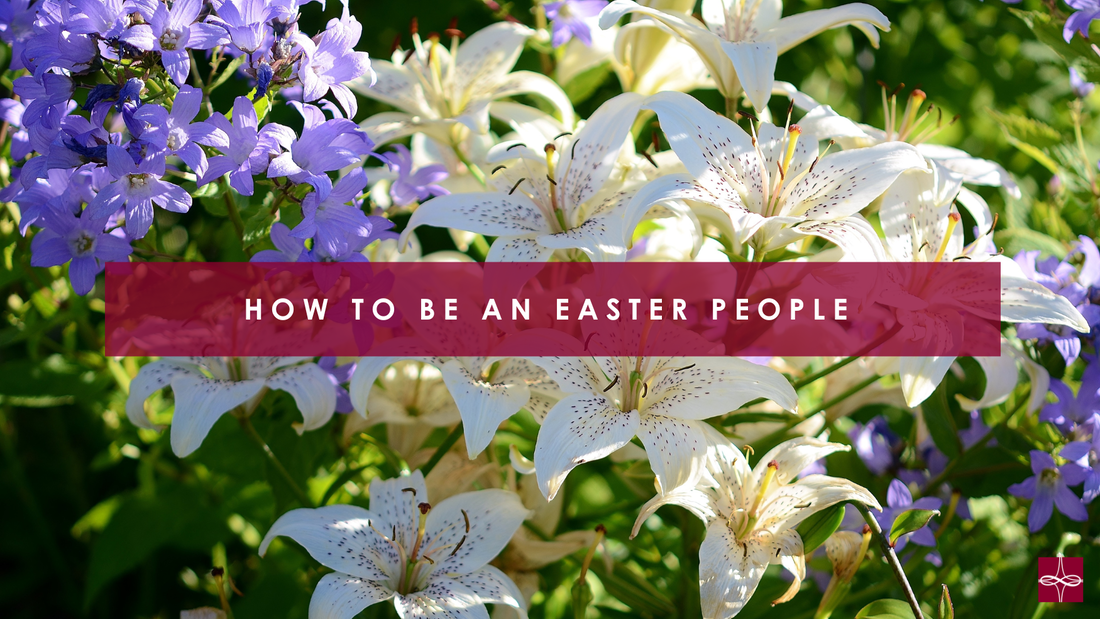


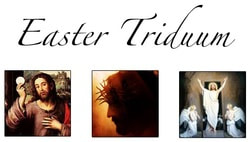
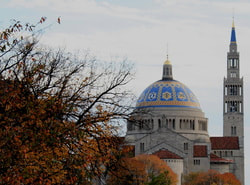
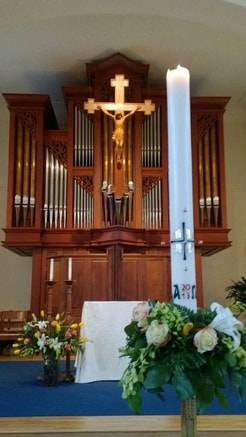
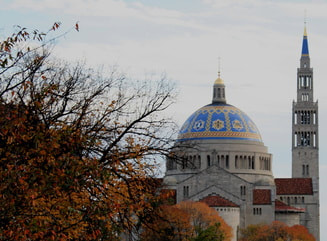
 RSS Feed
RSS Feed